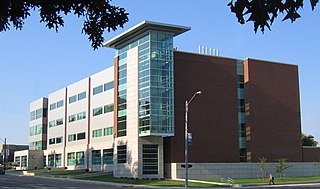Related Research Articles

The University of Tennessee system is a system of public universities in the U.S. state of Tennessee. It is one of two public university systems, the other being the Tennessee Board of Regents (TBR). It consists of four primary campuses in Knoxville, Chattanooga, Pulaski and Martin; a health sciences campus in Memphis; a research institute in Tullahoma; and various extensions throughout the state.

The University of Tennessee Health Science Center (UTHSC) is a public medical school in Memphis, Tennessee. It includes the Colleges of Health Professions, Dentistry, Graduate Health Sciences, Medicine, Nursing, and Pharmacy. Since 1911, the University of Tennessee Health Science Center has educated nearly 57,000 health care professionals. As of 2010, U.S. News & World Report ranked the College of Pharmacy 17th among American pharmacy schools.
Health equity arises from access to the social determinants of health, specifically from wealth, power and prestige. Individuals who have consistently been deprived of these three determinants are significantly disadvantaged from health inequities, and face worse health outcomes than those who are able to access certain resources. It is not equity to simply provide every individual with the same resources; that would be equality. In order to achieve health equity, resources must be allocated based on an individual need-based principle.

Kathy Giusti is a business leader and a healthcare disrupter. She is a two-time cancer survivor having been diagnosed with multiple myeloma and breast cancer. Kathy Co-Founded the Multiple Myeloma Research Foundation where she served as CEO and president for nearly two decades. She also co-chaired the Harvard Business School (HBS) Kraft Precision Medicine Accelerator, which she helped found, as a Senior Fellow at Harvard Business School.
The social determinants of health are the economic and social conditions that influence individual and group differences in health status. They are the health promoting factors found in one's living and working conditions, rather than individual risk factors that influence the risk or vulnerability for a disease or injury. The distribution of social determinants is often shaped by public policies that reflect prevailing political ideologies of the area.

Michael Robert Kremer is an American development economist currently serving as University Professor in Economics at the University of Chicago and Director of the Development Innovation Lab at the Becker Friedman Institute for Research in Economics. Kremer formerly served as the Gates Professor of Developing Societies at Harvard University, a role he held from 2003 to 2020. In 2019, Kremer was jointly awarded the Nobel Memorial Prize in Economic Sciences, together with Esther Duflo and Abhijit Banerjee, "for their experimental approach to alleviating global poverty."

Tomas J. Philipson is a Swedish-born American economist who served as the Acting Chairman of the Council of Economic Advisers in the Trump administration. He departed from the position and the Council at the end of June, 2020, to return to the University of Chicago. He holds the Daniel Levin Chair in Public Policy at the University of Chicago, with posts in the Harris School of Public Policy Studies, Department of Economics, and the Law School. He was a Director of the Becker Friedman Institute at the university.
Lisa A. Cooper is an American internal medicine and public health physician who is the Bloomberg Distinguished Professor of Equity in Health and Healthcare at Johns Hopkins University, jointly appointed in the Johns Hopkins School of Medicine, Johns Hopkins School of Nursing and in the departments of Health, Behavior and Society, Health Policy and Management; Epidemiology; and International Health in the Johns Hopkins Bloomberg School of Public Health. She is the James F. Fries Professor of Medicine in the Division of General Internal Medicine, Director of the Johns Hopkins Center for Health Equity, and Director of the Johns Hopkins Urban Health Institute. Cooper is also a Gilman Scholar and a core faculty member in the Welch Center for Prevention, Epidemiology, and Clinical Research. She is internationally recognized for her research on the impact of race, ethnicity and gender on the patient-physician relationship and subsequent health disparities. She is a member of the President’s Council of Advisors on Science and Technology (PCAST). In 2007, she received a MacArthur Fellowship.

The Gender Inequality Index (GII) is an index for the measurement of gender disparity that was introduced in the 2010 Human Development Report 20th anniversary edition by the United Nations Development Programme (UNDP). According to the UNDP, this index is a composite measure to quantify the loss of achievement within a country due to gender inequality. It uses three dimensions to measure opportunity cost: reproductive health, empowerment, and labor market participation. The new index was introduced as an experimental measure to remedy the shortcomings of the previous indicators, the Gender Development Index (GDI) and the Gender Empowerment Measure (GEM), both of which were introduced in the 1995 Human Development Report.
Amy Nadya Finkelstein is a professor of economics at the Massachusetts Institute of Technology (MIT), the co-director and research associate of the Public Economics Program at the National Bureau of Economic Research, and the co-Scientific Director of J-PAL North America. She was awarded the 2012 John Bates Clark Medal for her contributions to economics. She was elected to the National Academy of Sciences and won a MacArthur "Genius" fellowship in 2018.
The World Health Organization (WHO) has defined health as "a state of complete physical, mental, and social well-being and not merely the absence of disease or infirmity." Identified by the 2012 World Development Report as one of two key human capital endowments, health can influence an individual's ability to reach his or her full potential in society. Yet while gender equality has made the most progress in areas such as education and labor force participation, health inequality between men and women continues to harm many societies to this day.
Heidi Williams is a Professor of Economics at Dartmouth College and Director of Science Policy at the Institute for Progress. She is a graduate of Dartmouth College, and earned her MSc in development economics from Oxford University and her PhD in Economics from Harvard University. Prior to Dartmouth, Williams was the Charles R. Schwab Professor of Economics at Stanford University and an associate professor at the Massachusetts Institute of Technology. She is a member of the National Bureau of Economic Research.
Karen C. Johnson is the chair for the Department of Preventive Medicine at the University of Tennessee Health Science Center (UTHSC). She has been involved in at least five clinical world trials, including a Women's health initiative, the SPRINT Trial, the Look AHEADStudy, the TARGIT Study and the D2d Trial. She has been noted by Thomson Reuters as one of the world's most-cited scientists.
The weathering hypothesis was proposed to account for early health deterioration as a result of cumulative exposure to experiences of social, economic and political adversity. It is well documented that minority groups and marginalized communities suffer from poorer health outcomes. This may be due to a multitude of stressors including prejudice, social alienation, institutional bias, political oppression, economic exclusion and racial discrimination. The weathering hypothesis proposes that the cumulative burden of these stressors as individuals age is "weathering," and the increased weathering experienced by minority groups compared to others can account for differences in health outcomes. In recent years, the biological plausibility of the weathering hypothesis has been investigated in studies evaluating the physiological effects of social, environmental and political stressors among marginalized communities. This has led to more widespread use of the weathering hypothesis as a framework for explaining health disparities on the basis of differential exposure to racially based stressors. Researchers have also identified patterns connecting weathering to biological phenomena associated with stress and aging, such as allostatic load, epigenetics, telomere shortening, and accelerated brain aging.
Melissa A. Thomasson is an American economist. She is the Julian Lange Professor of Economics at Miami University in Oxford, Ohio, where she has also been the chair of the department of economics. She studies economic history, focusing on the evolution of health insurance and health care in the United States.
Susan Williams McElroy is an American economist who is an Associate Professor of Economics and Education Policy at the University of Texas-Dallas. She is a former president of the National Economic Association.
David "Neil" Hayes is an American oncologist and physician–scientist. He is the Van Vleet Endowed Professor in Medical Oncology and the division chief of haematology and oncology at the University of Tennessee Health Science Center. As a result of his research, Hayes was elected a Member of the American Society for Clinical Investigation.
Folakemi Titilayo Odedina is a Nigerian-born scientist and professor of pharmacy and medicine at the University of Florida. She is the principal investigator for the Prostate Cancer Transatlantic Consortium (CaPTC), a clinical research group using genomic science and environmental etiology to exploring disproportionate burden of prostate cancer among Black men funded by the NCI. She is a member of American Cancer Society's National Prostate Cancer Disparities Advisory Team.

Mary Violet Relling is an American pharmacogeneticist. Relling's research focuses on pharmacokinetics and pharmacodynamics in children and how genome variability influences a child's response to cancer chemotherapy.
Marcella Alsan is an economist at Harvard University who is also a physician. She is known for her works in the field of health inequality and developmental economics. She is currently a professor of Public Policy at the Harvard Kennedy School and was previously an associate professor of medicine at Stanford University. She uses randomized evaluations and historical public health natural experiments to study how infectious disease, human capital, and economic outcomes interact. She has studied the effects of the Tuskegee Syphills Experiment on health care utilization and mortality among Black men. Alsan was awarded a MacArthur Fellowship in 2021.
References
- ↑ Communications and Marketing (1970-01-01). "Shelley White-Means Receives American Economic Association Appointment". UTHSC News. Retrieved 2020-09-27.
- ↑ "SHELLEY I. WHITE-MEANS". Who's Who of Professional Women. 2017-11-02. Retrieved 2020-09-27.
- ↑ Reisser, Peggy (2020-02-14). "UTHSC Researcher's Career Focused on Reducing Health Disparities in her Hometown". UTHSC News. Retrieved 2020-09-27.
- ↑ "Newsletter of the Committee on the Status of Women in the Economics Profession: Board Member Biography--Shelley White-Means". American Economic Association. Fall 2011.
- ↑ "Investigators Earn $1.3 Million Grant for Health Disparities Research". www.uthsc.edu. December 24, 2009. Retrieved 2020-09-27.
- ↑ "CHEER". UTHSC. Retrieved 2020-09-27.
- ↑ "Rufus A. Lyman Award | American Journal of Pharmaceutical Education". www.ajpe.org. Retrieved 2020-09-27.